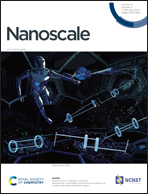Influence of functionalized core–shell structure on the thermodynamic and shape memory properties of nanocomposites†
Abstract
Filler/matrix interfacial cohesion exerts a straightforward effect on stress transfer at the interface in composite structures, thereby significantly affecting their integrated mechanical properties. Thus, controlling the interface interaction of polymers/fillers is essential for the fabrication of high-performance polymer composites. In this work, a functionalized core–shell structured hybrid was prepared via charge attraction and applied as a novel filler in the trans-1,4-polyisoprene matrix to improve the interfacial interaction of the filler/matrix. A series of tests on the micro- and macroscale was performed to investigate its thermal, mechanical and shape memory performances. The obtained results show that while guaranteeing the shape memory properties of the composites, the utilization of the core–shell structured hybrid not only improved the heat resistant performance, but also contributed to better mechanical properties. This provides solid evidence for the potential of the innovative method presented herein, which may shed some light on the improvement of the interface design strategy and the development of composites with high performances.



 Please wait while we load your content...
Please wait while we load your content...